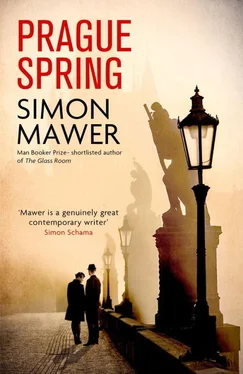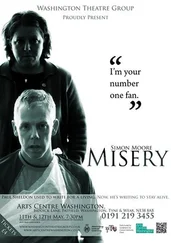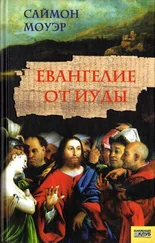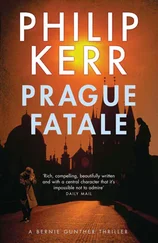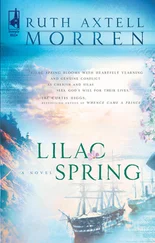After the meeting breaks up – there are questions, statements, arguments, laughter, groans and catcalls – he comes over to Sam and grabs his hand with surprising strength. ‘We bring freedom to Czechoslovak people,’ he announces. ‘Freedom will be compulsory.’
‘That’s a good line.’
Jitka glosses her man’s English with a quiet urgency: ‘He means, not the freedom of Dubček’s party, not communist freedom given out like sweets to children. But real freedom, of heart and soul.’
Zdeněk speaks quickly to her in Czech, so fast and colloquial that Sam only gathers the odd word. Amongst which americký and kapitál . ‘And not American freedom either,’ Jitka explains. ‘We will not be slaves to capital any more than we will be slaves to Marxism. We are ready to forge a new instrument. We are, you see, the children of communism. We were born in the socialist state and that is all we have known, and now we are demanding something different.’
People have gathered round, listening to what is being said, eager to put their point of view. Word has got out that Sam is from the embassy. ‘When will the Americans help us?’ someone asks.
‘We don’t want Americans,’ another interrupts. ‘Americans are bad as Russians. We want our own future.’
‘You come to our public meeting tomorrow,’ says the Strelnikov character, leaning forward and speaking urgently into Sam’s face. ‘Can you do that? Can you?’ Once again he takes hold of Sam’s hand to emphasise his point, the urgency of it.
‘Of course I can. Just tell me where.’
Driving back through the Old Town, Sam is reminded of the protesting students back home. He saw them on a visit to his mother in Oxford a few months ago. They were occupying the Clarendon building, playing politics as though it were a parlour game dreamed up for a bit of entertainment. Deanz Meanz Feinz had been chalked on the walls of Balliol, alongside Je suis Marxiste, tendance Groucho . The Czech students might look no different from the Oxford ones – the same worn T-shirts and bomber jackets, the same faded jeans, the same unkempt hair, the boys barely differentiated from the girls – but this lot aren’t playing a game. At work he sees the intelligence briefings. He knows of the thousands of Russian troops within the Czechoslovak borders, still there after military exercises in the spring; and he knows of the hundreds of thousands more waiting just outside the borders in neighbouring, fraternal, East Germany, Poland, Hungary and Ukraine. Soldiers and tanks, the full panoply of the Warsaw Pact poised to crush one of its own member states. Unlike British students, Czech students won’t be able to run home to Mummy and Daddy if that particular axe falls.
That afternoon he tries to phone Steffie’s friends in Germany to see if she has arrived, but he can’t get through. ‘You can book a call,’ the operator informs him. ‘It will take five hours.’
The meeting next day was in a deconsecrated church in the new town. It was part of Sam’s job to attend as many meetings like this as he could, and since the first student protests the previous year he had got to know many of the leaders. Stephanie used to come with him whenever she was free – somehow she made his presence less obvious, although he never tried to conceal what he was doing there. ‘I’m at the British embassy,’ he’d say if asked. ‘I’m not a spy or anything. Just interested in what’s going on.’
This time the group was new, the Strelnikov character was new, and who could say what might become of it or him? The meeting was all to do with forming a new political movement. Svobodná strana or something; the Freedom Party.
When she caught sight of Sam, Strelnikov’s wife, Jitka, raised her hand in acknowledgement. She was one of a little gaggle of activists milling around in the place where the high altar had once been, fixing microphones and speakers and arguing about where the chairs should go. He went over and said hello to her and the preoccupied Zdeněk, shook a few hands, exchanged a few words. They were students, mainly. One of the helpers turned and smiled at him. Blue eyes and Slav cheekbones and careless hair. Jeans and a leather jacket. A complexion that wasn’t flawless like Stephanie’s and features that weren’t as perfect. But strong. Face not quite beautiful. Hair not quite blonde. If features betray character, then these suggested strength and a certain amused indifference. They hovered on the edge of beauty without doing anything so obvious as stepping over the borderline. ‘Lenka Konečková,’ she said, her eyes holding Sam’s at the same time as her hand grasped his. ‘I saw you at meeting before.’ Good English, which was rare. ‘I remember you.’
‘I’m afraid I don’t—’
‘You don’t see me. Of course not.’
‘I can’t think why I didn’t.’
A wry smile. And that look, a communication that moved at the speed of light, that was light, nothing more, crossing the gap between them and carrying with it a message that needed no deciphering but made things happen inside him – a swelling, a weakness, a fluttering running through his viscera as though something had come loose. He hadn’t expected this, really he hadn’t.
‘Samuel Wareham. I’m from the British embassy.’
‘They told me. You speak good Czech. A bit Russified but good.’
‘Russian was my main language at university.’
A beguiling laugh. ‘Tainted, then.’
‘I’m trying to purge it. Look…’ Sam hesitated, looking round, trying to work out if there was anyone else with particular claims on this girl – what was her name? Lenka? – but it seemed she was on her own. He thought of Stephanie somewhere in West Germany, chatting happily to Jenny – her old school chum – about life on the other side of the Iron Curtain, about Prague and her job, and, presumably, about Sam. Saying what? That they were sort of engaged. An understanding, really. Imagine being a dip’s wife! But the relationship wasn’t always easy… ‘Do you want to come for a drink when you’re finished here? So we can have a chat. In Czech.’
She shrugged. ‘And I can tell you how you go wrong? Sure.’
And then the rest of the meeting, the voting, the passing of motions, the arguing and the applauding, and all the time the girl called Lenka sitting on the other side of the nave from him, taking notes some of the time but also glancing across at him. The occasional conjunction of eyes. The suggestion of a smile. At the end of the speeches a young girl mounted the rostrum, carrying a guitar. People applauded as this approximate Joan Baez lookalike stood there in the crossing of the ex-church, looking faintly diffident, slightly dishevelled, watching the audience with something like embarrassment. ‘We’ve even got an anthem,’ she announced into the microphone. Lenka glanced across at Sam with a deprecating smile while the singer fiddled with a capo and then struck the first chord. It was all predictable enough: ‘We Shall Overcome’, sung without the evangelical fervour that seemed to characterise it in the West but with something that only central Europe could manage – a kind of bitter irony. We shall overcome some day, perhaps, but surely not now. No one sang along but at the end, everyone clapped. And standing there beneath the dome of the deconsecrated church, Lenka Konečková looked directly across at Sam and smiled. As though there was a joke to be shared.
He smiled back, wondering about Stephanie beetling around the German countryside in her Beetle. What would she think of the look that Lenka Konečková was even now directing back across the church at him, a blend of amusement and curiosity that brought with it disturbing possibilities? Surely this encounter was entirely innocent; but innocence could so easily spill over into guilt.
Читать дальше
